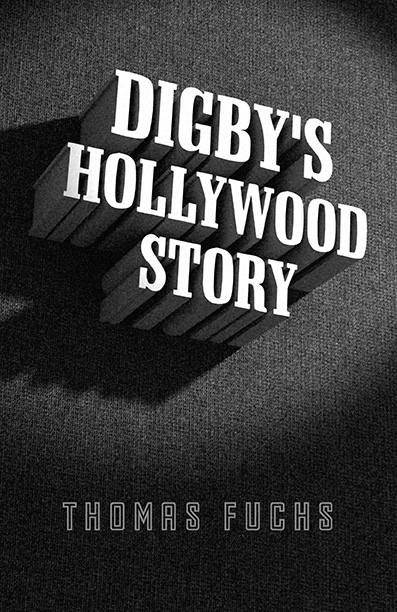“Digby’s Hollywood Story”, by Thomas Fuchs
In an age of literature written for television and movies, an age of sequels and reboots, and an age of selfies, one wonders at the cultural relevance of storytelling through the written word. No, I don’t think visual mediums will replace literature in the way that video cassettes, DVDs, and the Internet were supposed to ruin the cinematic experience. But after reading Thomas Fuchs’ “Digby’s Hollywood Story”, I can’t help but consider the significance of story itself.
This novella is a tease, the kind of tease that excites and frustrates, but which leaves you with a generous taste of profundity. The elements are all present for rich, melodramatic noir: a down to earth fella with a badge and a nose for trouble; mysterious dames that radiate seductive power and vulnerability; big money and big cover-ups; a sudden, suspicious event with dire potential consequences for our hero. But embedded in it all is a commentary so meta that it leaves your expectations in a chalk outline.
Fuchs has made a grandiose point about the stories we tell ourselves in a wonderfully subtle and ironic way. He handles his noir with care, knowing you’ve read The Maltese Falcon or The Killer Inside Me, luring you back into the genre with the light and shadowy hand of slow-burn tension. Then his twist emerges, and it is one that should have been painfully obvious, but its cleverness lies in the fact that the reader blinds himself or herself to the truth of the matter. The story knows you want to be deceived, that you want to be Digby, at the center of some grand illusion where only you can save the day and get the girl and mete out justice.
This novella is very much worth the read, whether you are a casual reader or someone with a personal library. The writing is, like Digby himself, straight-forward and direct. It delivers its atmosphere and tone with a minimum of fuss and it avoids the excesses that can plague so much of crime noir. Despite the short length, the story manages to take its time and develop its protagonist in a very compelling way, and it achieves this through not wasting time in anything that is not needed to move forward. Moreover, the commentary provides a layer of depth that is valuable to anyone with the creative impulse, especially where storytelling is concerned.
But, and consider this your fair warning, be prepared to consider this story’s implications for the culture we live in today. By the end of the read, you may very well be left wondering if you have been wasting time trying to get your life to fit a cliché narrative.
Digby’s Hollywood Story is now available through Roundfire Books

